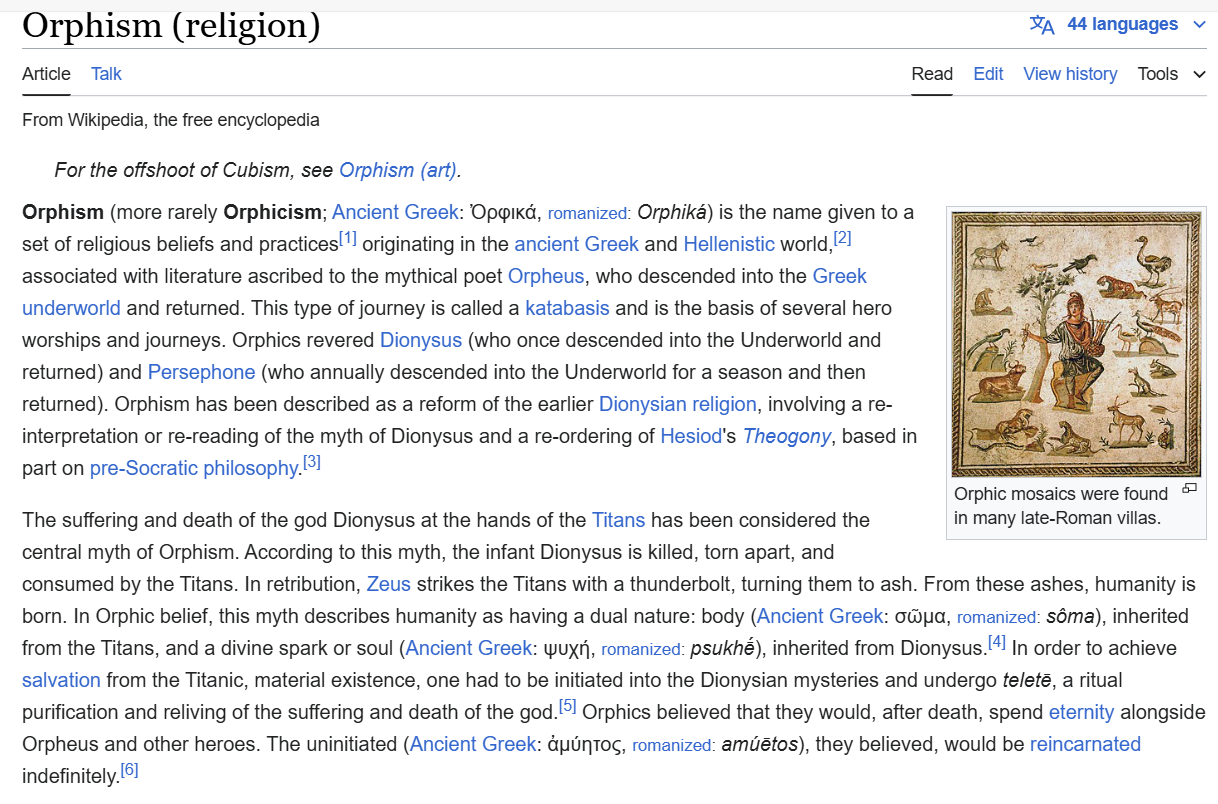ORPHISM

Orphism (religion) - Wikipedia
Orphism (more rarely Orphicism; Ancient Greek: Ὀρφικά, romanized: Orphiká) is the name given to a set of religious beliefs and practices[1] originating in the ancient Greek and Hellenistic world,[2] associated with literature ascribed to the mythical poet Orpheus, who descended into the Greek underworld and returned. Orphics revered Dionysus (who once descended into the Underworld and returned) and Persephone (who annually descended into the Underworld for a season and then returned). Orphism has been described as a reform of the earlier Dionysian religion, involving a re-interpretation or re-reading of the myth of Dionysus and a re-ordering of Hesiod's Theogony, based in part on pre-Socratic philosophy.[3]
The central focus of Orphism is the suffering and death of the god Dionysus at the hands of the Titans, which forms the basis of Orphism's central myth. According to this myth, the infant Dionysus is killed, torn apart, and consumed by the Titans. In retribution, Zeus strikes the Titans with a thunderbolt, turning them to ash. From these ashes, humanity is born. In Orphic belief, this myth describes humanity as having a dual nature: body (Ancient Greek: σῶμα, romanized: sôma), inherited from the Titans, and a divine spark or soul (Ancient Greek: ψυχή, romanized: psukhḗ), inherited from Dionysus.[4] In order to achieve salvation from the Titanic, material existence, one had to be initiated into the Dionysian mysteries and undergo teletē, a ritual purification and reliving of the suffering and death of the god.[5] Orphics believed that they would, after death, spend eternity alongside Orpheus and other heroes. The uninitiated (Ancient Greek: ἀμύητος, romanized: amúētos), they believed, would be reincarnated indefinitely.[6]
In order to maintain their purity following initiation and ritual, Orphics attempted to live an ascetic life free of spiritual contamination, most notably by adhering to a strict vegetarian diet that also excluded broad beans.
Orpheus is the archetypal musician of Greek myth, whose singing enchants all of nature and even the realm of the dead. His mother is Calliope, Muse of epic. His fatherPind. fr. 128c 11-12Pind. Pyth. 4.176-7Schol. Pind. Pyth. 4, 313a is sometimes Apollo, but usually the Thracian Oeagrus—a river god, according to ServiusServ. in Aen. 6.645. By the classical period, Orpheus is known as the author of mystical hexameter poetry and founder of mysteries[Apollod.] Bibl. 1.3.2Damag. Anth.Pal. 7.9Diod. Sic. 5.64.4Ar. Ran. 1030-6[Eur.] Rhes. 941-7[Dem.] 25.11Diod. Sic. 4.25.1, most importantly at Eleusis (Graf 1974). Accounting for the relationship between his mythical, mystical and authorial identities proves a challenge for the many interested parties.